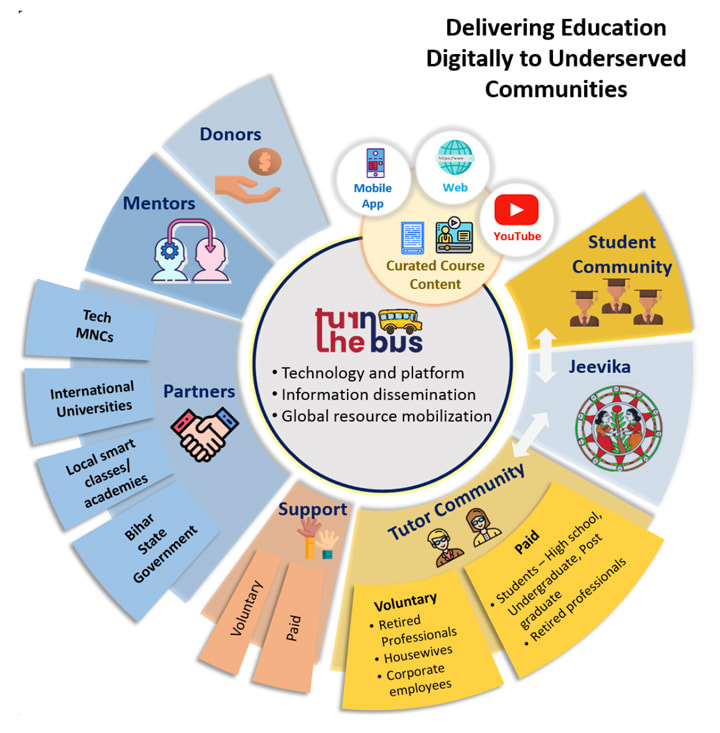|
Kelsang Turn The Bus believes that if students are provided access to quality curricular education by leveraging digital technology, then intergenerational poverty can gradually be eliminated.
What is ‘Theory of Change’? Any development program, in its very planning stage, requires a plan that explicitly describes its goal, objectives, activities, inputs and outputs. A ‘Theory of Change can be described as a tool which explains how “... the activities undertaken by an intervention (such as a project, program or policy) contribute to a chain of results that lead to the intended or observed impacts.” [1] In development literature, Carol Weiss’s “Nothing as Practical as Good Theory” [2] made the concept of Theory of Change popular as also tool that can help organisations efficiently evaluate their programs and projects, as intended outputs and impact are clearly stated and described prior. Turn The Bus’s Theory of Change If you are reading this, you have surely read the first two sentences of this blog. This is an example of how organisations first state their Theory of Change, using “if___, then___”, before explaining it in greater detail, often with diagrams and graphs. To explain this statement simply, our Theory of Change underlines how our activities will lead to our goal of helping eliminate poverty. Specifically, leveraging the potential of smartphones and mobile internet that reach students directly will give them access to our quality curricular education videos and the content accessed by students would lead them to better livelihood opportunities. This means that our Theory of Change also helps us guide our program evaluation criteria, as we develop methods to monitor student engagements, progress and examination results, with complete engagement of local community members as partners and facilitators. Implementing our ‘Theory of Change’: Our Current Program The above finally points to the obvious question- how are we, today, implementing our Theory of Change on ground? Today, Turn The Bus’s model employs paid subject- matter tutors who create high quality curricular educational videos (including in local languages), which are accessed by our students, through our EdTech mobile application. These videos are supplemented by an interactive peer-to-peer learning, by leveraging the group chat feature on Whatsapp, another digital technology. Cumulatively, learnings aim to lead to better examination outcomes of matriculating students of Class 12 and Class 10, which ultimately lead to their enrollment in universities, which is not the case of a large number of high school students today. Going to university or a vocational education training program would put students on the path towards employment and ultimately, towards intergenerational poverty elimination. A previous blog [4] explains our pilot project ‘Toppers As Tutors’ in more detail. We hope this blog has briefly encapsulated our Theory of Change and how we aim to achieve it. [1] https://www.betterevaluation.org/en/node/5280 [2]https://www.semanticscholar.org/paper/Nothing-as-Practical-as-Good-Theory-%3A-Exploring-for-Weiss/ed98a1ac4b7b54ef4854b7b7a802db7b3e46ae02?p2df [3] https://turnthebus.org/about/our-approach [4]https://turnthebus.org/blog/toppers-as-tutors-how-turn-the-bus-involves-community-participation-in-education
0 Comments
Leave a Reply. |
Archives
March 2024
Categories |
21213 SE 42nd Pl.
Issaquah WA 98029
Issaquah WA 98029
Turn the Bus is a registered 501 (c) (3) US nonprofit organization.
© Turn the Bus. All rights reserved.
© Turn the Bus. All rights reserved.


 RSS Feed
RSS Feed
